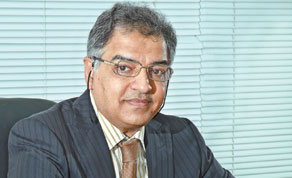 |
| Dr Ahmed Seif Makki |
The now banned French-made Poly Implants Protheses (PIP) used for breast enlargement and augmentation around the world, were not used by plastic surgeons in Qatar thanks to stringent measures on importation of medical supplies and devices by the health authorities, Gulf Times has learnt.
PIP founded in 1991 by Frenchman Jean-Claude Mas specialised in the manufacture of silicone implants, pre-filled saline breast implants, testicular implants and custom made implants.
At the end of March 2010, the French medical regulatory authority suspended the marketing, distribution, export and use of the silicone gel filled PIP breast implants having discovered that the silicone used was industrial grade and not suitable for medical purposes.
Since it was established, the company was said to have manufactured and sold about 400,000 implants worldwide, which is the main reason why governments in countries like the UK, Venezuela, Brazil are asking women who have received the implants to get their breasts checked for any rupture and possibly remove the implants.
However, inquiries at a number of private plastic and cosmetic surgery centres in Qatar revealed that the French-made implants could not have found their way into the country due to “very strict and thorough scrutiny” of any medical supplies including medicines and devices being brought into the country.
“I have not come across this particular brand of breast implant here because it could not have scaled through the rigorous checking usually done on all medical items being imported into the country by the Supreme Council of Health (SCH),” Plastic Surgicentre consultant plastic surgeon Dr Ahmed Seif Makki told Gulf Times.
He mentioned that for any medical centre to make use of any medical item or device, the SCH must approve and certify it .
“The SCH has a good control on all medical instruments, equipment and materials that we use for our clients. The council ensures that the products are registered with and approved by the appropriate organisation. For instance, if we want to import something like Botox or fillers, we have to send a letter detailing the name and brand of the product, its manufacturer and sponsor in the Gulf, to the SCH to seek their approval and before endorsing the product, it is subjected to stringent testing,” Dr Makki explained.
He mentioned that the centre, which has been operating in Qatar and specialising in breast enlargement and augmentation, is using the implants manufactured by two top US companies Allergan and Mentor and none of the products have been found defective.
“We do follow up on our patients and none has so far complained against the products nor do they experience rupture or other health problems due to the implants and in fact, the routine regular check that we do for them is not much different from the usual check up most women need as they grow older such as mammography and X-ray,” he explained.
According to him, after tummy tuck and liposuction, women in their 20s and 40s are mostly craving for breast implantation and breast reduction in Qatar.
Other cosmetic surgical and non-surgical procedures that are also popular in the country according to him include face lifting, Botox injection-fillers and laser hair removal.
However, Dr Makki urged those seeking cosmetic correction to always avoid cheap processes and cheap physicians as they could end up with serious complications thus causing them to shell out more money while seeking the cure.
“People should be wary of any centre offering them ridiculously low charges for cosmetic surgery as they could do them more damage than good because charges for plastic surgery are not fixed and should actually be tailored to individual’s needs as different people may require different approaches for similar procedures,” he maintained.

